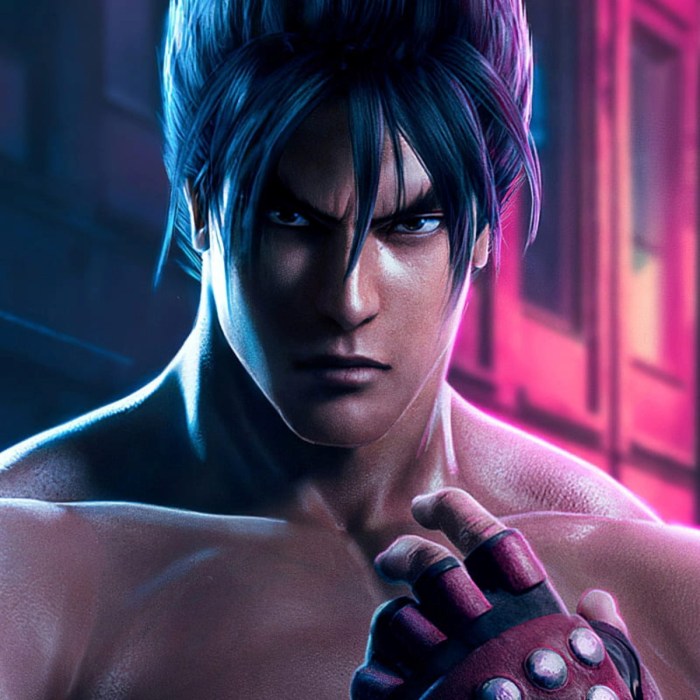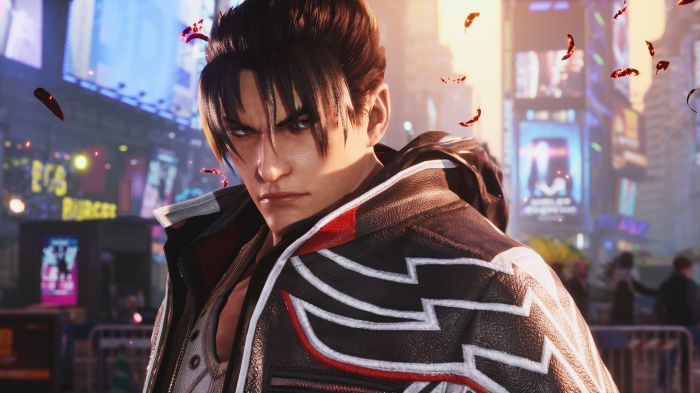Jin Kazama’s Character Development
Jin Kazama’s journey in the Tekken series is one of internal conflict, shaped by his struggle with the Devil Gene and his desire to protect those he cares about. From the innocent young boy in Tekken 3 to the conflicted warrior in Tekken 7, Jin’s character arc is a compelling exploration of the battle between good and evil within.
Jin’s Devil Gene and Its Impact
The Devil Gene, a powerful and destructive force passed down through Jin’s lineage, is a central element in his character development. It manifests as a demonic alter ego, Kazuya Mishima’s Devil, which grants Jin immense power but also threatens to consume him. The Devil Gene is not simply a source of power but also a source of internal conflict and pain for Jin.
- The Devil Gene’s influence is first seen in Tekken 3, where Jin is haunted by nightmares and experiences bouts of uncontrollable rage. This struggle with his inner demons is a defining aspect of his character, highlighting the internal battle he faces.
- As Jin progresses through the series, he becomes more aware of the Devil Gene’s influence and attempts to control it. However, the Devil Gene continues to exert its power, leading to moments of violence and destruction. This struggle for control is a constant theme in Jin’s character arc, emphasizing the complexities of his internal conflict.
- The Devil Gene’s impact is not limited to Jin’s physical abilities; it also affects his personality and actions. In moments of intense anger or desperation, Jin can lose control and succumb to the Devil Gene’s influence. This can lead to destructive consequences, as seen in Tekken 5, where Jin sacrifices his humanity to defeat his grandfather, Heihachi Mishima.
Jin’s Character Development Compared to Other Tekken Characters
Jin’s character development is distinct from other major Tekken characters, highlighting the unique challenges he faces.
- While Kazuya Mishima is consumed by his ambition and desire for power, Jin is driven by a sense of responsibility and a desire to protect others. This internal conflict sets Jin apart from Kazuya, who embraces the Devil Gene as a source of power.
- Unlike Heihachi Mishima, who seeks to achieve his goals through ruthless ambition and manipulation, Jin struggles to control the Devil Gene’s influence and seeks to find a balance between his human side and his demonic nature. This internal conflict sets Jin apart from Heihachi, who is driven by a desire for power and control.
- Compared to characters like Paul Phoenix, who are driven by their own personal goals, Jin is motivated by a desire to protect others and find a way to live with the Devil Gene. This sets Jin apart from characters who are primarily focused on their own personal desires and ambitions.
Fan Reactions to the Apology
The apology issued by the Tekken producer for Jin Kazama’s character development sparked a diverse range of reactions within the Tekken community. Fans expressed their views on various platforms, including fan forums, social media, and news outlets, showcasing a spectrum of opinions.
Analysis of Fan Reactions
The apology ignited a debate within the Tekken community, with fans expressing a variety of perspectives. Some fans welcomed the apology, seeing it as a sign of acknowledgement and a step towards addressing concerns regarding Jin’s character arc. Others remained unconvinced, arguing that the apology was insincere or that it did not adequately address the issues surrounding Jin’s portrayal.
Diverse Reactions in the Tekken Community
The following table provides a glimpse into the diverse reactions from the Tekken community:
| Platform | Reaction | Key Arguments |
|—|—|—|
| Tekken Forums | Positive | “It’s good to see the producers acknowledging the issues with Jin’s character arc. This shows they are listening to the fans.” |
| Reddit | Mixed | “While I appreciate the apology, I’m not sure it’s enough. Jin’s character development has been inconsistent for years.” |
| Twitter | Negative | “This apology feels insincere. It’s just damage control after the backlash.” |
| Gaming News Outlets | Neutral | “The Tekken producer’s apology has sparked a debate within the community, with fans expressing a variety of perspectives.” |
Comparing and Contrasting Fan Viewpoints
The following table compares and contrasts the different viewpoints expressed by fans:
| Viewpoint | Key Arguments |
|—|—|
| Positive | – Acknowledgement of concerns – Step towards addressing issues |
| Negative | – Insincere apology – Inadequate address of concerns |
| Neutral | – Diverse perspectives – Debate within the community |
The Future of Jin Kazama in Tekken: Tekken Producer Apologizes Jin Kazama
The producer’s apology for Jin’s actions has opened up a new chapter in the Tekken narrative, leaving fans pondering the potential ramifications for the series’ iconic protagonist. The apology, while not explicitly condoning Jin’s choices, acknowledges the internal struggles that led him down a dark path. This sets the stage for a fascinating exploration of redemption and growth for Jin in future Tekken games.
Potential Storylines for Jin
The apology offers a foundation for several potential storylines for Jin in future Tekken games. Here are some possibilities:
* Jin’s Redemption: The apology suggests a possibility for Jin to atone for his past actions. He could embark on a quest to repair the damage he has caused, seeking forgiveness from those he has hurt. This could involve confronting his inner demons, overcoming the Devil Gene’s influence, and ultimately finding peace within himself.
* Jin’s Relationship with Kazuya: The apology also creates an opportunity for Jin to reconcile with his father, Kazuya. This could involve a complex and emotionally charged storyline, exploring themes of forgiveness, family, and the cycle of violence.
* Jin’s Role as a Leader: Jin’s past actions have made him a controversial figure, but he could emerge as a leader who inspires others to fight for a better world. He could use his experience to guide others, leading a movement against the Devil Gene’s influence or working to prevent future conflicts.
Implications for the Tekken Narrative
The apology has significant implications for the overall narrative of the Tekken series. It could lead to a more nuanced and complex exploration of the Devil Gene’s influence and its impact on characters like Jin. This could involve exploring themes of choice, free will, and the struggle for redemption. The apology also suggests a shift in the series’ focus, moving away from the traditional cycle of revenge and towards a more hopeful future where characters like Jin can find redemption and healing.
The Role of Producer Apologies in Gaming
In the ever-evolving landscape of gaming, the relationship between developers, publishers, and players is more dynamic than ever. Producer apologies have emerged as a crucial element in navigating controversies, fostering community trust, and shaping the future of the industry.
The Effectiveness of Apologies in Addressing Controversies
Producer apologies can play a significant role in addressing controversies and mitigating potential damage to a game’s reputation. A sincere and well-crafted apology can demonstrate accountability, acknowledge mistakes, and show commitment to improvement. For example, when Blizzard faced backlash for its handling of the Hong Kong protests, the company’s initial response was met with criticism. However, a subsequent apology, acknowledging the community’s concerns and outlining steps to address the issues, helped to repair some of the damage.
The Impact of Producer Apologies in Different Gaming Contexts
The impact of producer apologies can vary depending on the context.
- In cases of technical issues or bugs, apologies can reassure players that developers are aware of the problems and actively working on solutions.
- In situations involving controversial content or design choices, apologies can demonstrate a willingness to listen to player feedback and make changes.
- However, apologies are not always effective, especially if they are perceived as insincere or lacking concrete action.
The Broader Implications of Producer Apologies in Gaming
Producer apologies have become a common practice in the gaming industry, reflecting the growing importance of player engagement and community feedback. They serve as a mechanism for developers and publishers to acknowledge mistakes, build trust with players, and demonstrate a commitment to transparency and accountability.
The Importance of Transparency and Action
While apologies can be valuable in addressing controversies, they are only effective if accompanied by transparency and concrete action. Players expect to see evidence that developers are taking steps to address the issues that led to the apology.
The Role of Public Perception, Tekken producer apologizes jin kazama
Public perception plays a crucial role in the effectiveness of producer apologies. If an apology is perceived as insincere or lacking in substance, it can further damage a game’s reputation.
Tekken producer apologizes jin kazama – The Tekken producer’s apology for Jin Kazama has left a lasting impact on the Tekken community, prompting introspection and sparking a dialogue about the evolving relationship between developers and their audiences. This apology, a testament to the power of fan engagement, serves as a reminder that even in the world of virtual combat, human connection and understanding play a crucial role. As fans eagerly await the next chapter in the Tekken saga, the apology serves as a bridge, connecting developers and players in a shared journey of storytelling and character exploration.
The Tekken producer’s apology for Jin Kazama’s character arc might have been a little too late, but hey, at least it’s something. Maybe the producers should take a break from the fighting game scene and check out the mw3 quarters classic reflex optic for a change of pace. After all, even the most hardcore Tekken fans need a break sometimes, right?
Maybe then they’ll come back with a fresh perspective and a better understanding of what makes a compelling character.
 IOT Hive Berita Teknologi Terbaru
IOT Hive Berita Teknologi Terbaru

